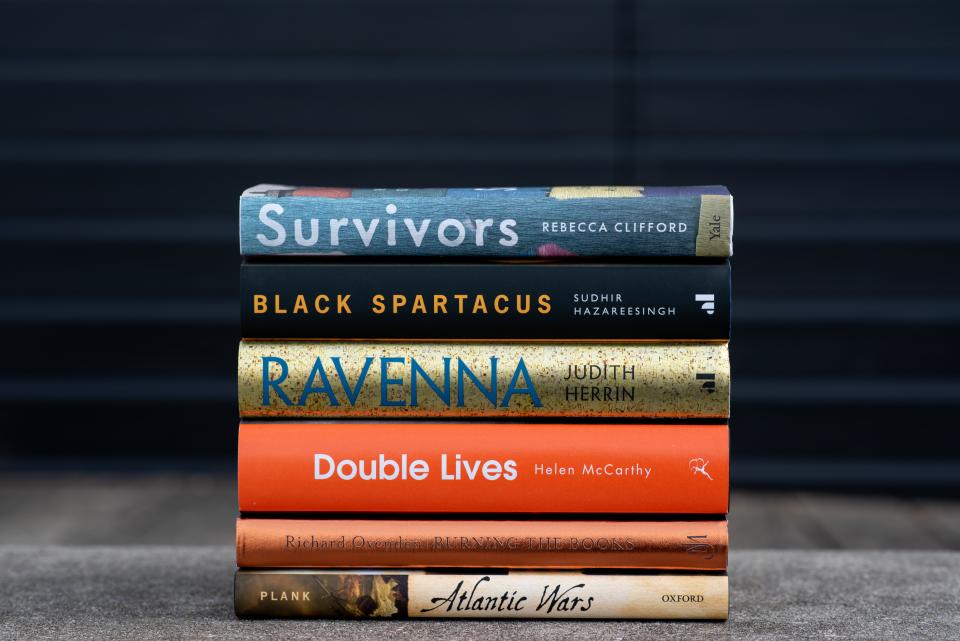Wolfson History Prize: Female historian’s ‘stylish’ book on working mothers puts her in the running for subject’s top award

The six shortlisted books in contention for this year’s Wolfson History Prize.
(Wolfson History Prize books. )A book on the lives of working mothers over centuries by a female historian who hit out over the Met’s handling of the Sarah Everard vigil has been shortlisted for her subject’s most high-profile award.
Helen McCarthy’s “Double Lives: A History of Working Motherhood” ranges from women in modern day Canary Wharf to Victorian Manchester to show how attitudes to mothers in the workplace have arisen and is one of six titles in the running for this year’s £40,000 Wolfson History Prize.
Other contenders in what the judges describe as a list reflecting the “diversity and quality of history writing in the UK” include “Survivors” by Dr Rebecca Clifford, which tells the story of child survivors of the Holocaust, including three still living in London, and “Black Spartacus” by the Oxford academic Sudhir Hazareesingh.
It tells how the former slave Toussaint Louverture led a successful slave revolt in Haiti against the French in 1791 to form the world’s first independent black state.
Judith Herrin, from King’s College, London, is also on the shortlist for her book “Ravenna”, which is described by the judges as a “magisterial” and “illuminating history of Europe from the 5th to 8th centuries as seen through the lens of an Italian city.”

The selection of Dr McCarthy’s history of working motherhood is likely to attract particular attention, however, both because of the topicality of her theme and because of her active presence on social media where she tweets under the hasthtag @HistorianHelen
One of her most hard-hitting tweets came last month when she told followers of her “anger” at the Met over its decision to break up the vigil on Clapham Common in memory of Sarah Everard after the disappearance and killing of the 33-year-old executive.
“The scenes of women being manhandled by police in Clapham tonight are utterly sickening,” Dr McCarthy wrote, adding in separate tweets that “London is brimming with pain and anger” and that the Met risked “losing public legitimacy altogether” as a result of its actions.
Her comments joined criticisms by others including the Lib Dem leader Sir Ed Davey and the London Mayor Sadiq Khan, although HM Inspectorate of Constabulary and Fire and Rescue Services later concluded in a report that the Met had acted appropriately and proportionately in enforcing Covid-19 restrictions on large gatherings.
The inspectorate also rebuked politicians for their “unwarranted” criticism of police, saying that the “chorus of those condemning police” was based on a “very limited understanding of what had happened”.
Further tweets by Dr McCarthy include one in which she endorsed a view that the “1990s/early 2000s” had been “formative of a new kind of (troubling) sexual culture”, saying that this “really rang true”.
In another she described a recent British Academy report showing that “women’s economic status in the UK has deteriorated during the pandemic” with those with young or school-age children the worst hit as a “must read”.
She also responded to a recent question about which lockdown rule she would like to stay in place by tweeting: ”I genuinely wouldn’t mind if I never shake anyone’s hand ever again. Or be kissed/embraced on social occasions by men with whom I have only a passing acquaintance.”
Announcing today’s shortlist, the Wolfson History Prize judges described Dr McCarthy’s book as “a stylish, lively account of the emotionally-charged issue of working mothers” that “displays a deeply-felt respect for the subject’s significance.”
There is similar praise for the other contenders and David Cannadine, the President of the British Academy and chairman of the judges, said that all six books shortlisted showed “the commitment of their authors to uncover some of the lesser-known narratives of the past.”
Paul Ramsbottom, the chief executive of the Wolfson Foundation, which funds the prize, added: “This past year has revealed much about how history is valued and contested in today’s society and why it is vital for us to engage carefully and thoughtfully with the experiences of those who came before us.
“These six books offer the opportunity to hear often forgotten or neglected voices from the ancient world to the modern day.”
The other two books in contention for the £40,000 prize are “Burning the Books” by Richard Ovenden, which is a history of libraries and knowledge under attack, and “Atlantic Wars” by Geoffrey Plank. It examines how warfare around the Atlantic Ocean affected lives from the late Middle Ages to the 19th century, taking in themes ranging from the Vikings to slavery and the impact on indigenous cultures.
The winner of the £40,000 prize will be announced on 9 June in a virtual ceremony with the five authors who miss out receiving £4,000 each.
Read More
Mothers launch campaign urging Londoners to speak up about knife crime
Mothers of knife crime victims urge Londoners to help end bloodshed
Mothers tell of ‘hardest calls’ after sons stabbed to death
Everything you need to know about the BOSS x Russell Athletic collab

 Yahoo Sport
Yahoo Sport 





































